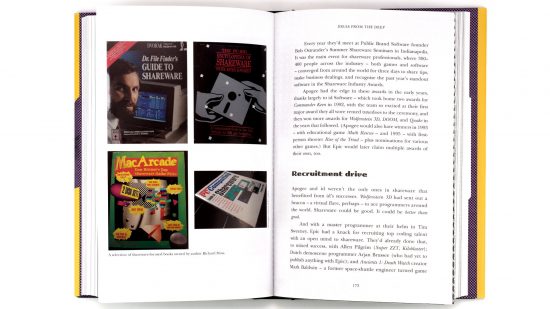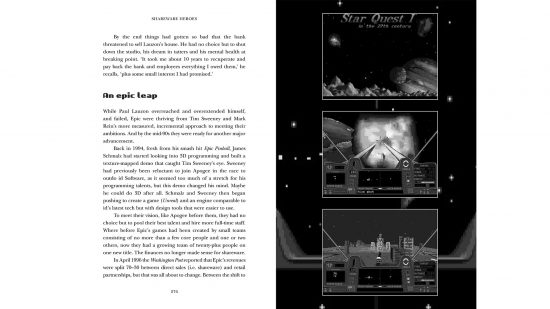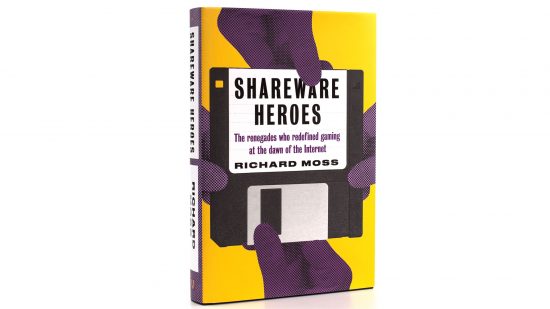Our Verdict
75%Despite a few strange printing decisions, this is a fun walk down Nostalgia Lane, whether you were a Mac user, Amiga user, DOS gamer, or Windows clicker, providing a window into how different the independent software market was back then.
Richard Moss is a man with a love for retro gaming. His first book, The Secret History of Mac Gaming, was a walk through the history of games on a machine that’s most associated with serious business. His second book, Shareware Heroes: The Renegades Who Redefined Gaming at the Dawn of the Internet, holds no such ties to a specific platform.
Shareware Heroes isn’t quite as lengthy as The Secret History of Mac Gaming, with 338 pages plus 16 color plates in the book’s center, compared to 416 for the first book, but that by no means indicates a lack of content.
Shareware Heroes is absolutely packed to the gills, yet by Moss’ own admission, it can’t even attempt to offer a truly comprehensive look at what was for years the most popular way to distribute, buy and sell games, as well as other computer software.
The book opens in the 1970s, when most independent software authors gave away their wares for free – being forbidden from using the ARPANET, the government precursor to what would become the Internet, for commercial purposes.
Even this early into the book, there’s information likely to surprise many people, such as the origins of the term ‘shareware’, and how it beat out the rather misleading and ironically trademarked ‘freeware’ and verbose ‘user-supported software’.
For readers unfamiliar with shareware, here’s a brief aside. In the days when a computer magazine came with a floppy disk glued to the cover, and when home internet connections were effectively unavailable, shareware was king.
Authors encouraged the copying and free distribution of their software, and asked for a small fee for ‘registration’ in order to unlock additional features, receive a printed manual or simply to reward the author for a job well done.

At the time when Andrew Fluegelman began distributing his PC-Talk communications software under these terms, it seemed outlandish that anyone would voluntarily pay. When millions of dollars began arriving at his door, though, it was clear he was on to a big idea.
As you might expect from the author of a book on retro gaming, there’s a heavy focus on shareware games rather than business software. It goes from 3D Pac-Man clone 3-Demon, released in 1983, to turn-of-the-century titles such as Tread Marks and, of course, the work of noted shareware giants, such as Apogee Software, id Software and Epic MegaGames.
There are no guest chapters this time around, and while Moss has interviewed as many shareware developers and distributors as possible, he admits there are gaps in the research. The biggest one is the loss of the CompuServe forums from the 1980s, where so much shareware was traded and discussed that the company would launch a middleman service in order to tack registration fees onto subscribers’ monthly bills.
The book also handles its citations in an unusual way. There’s no printed bibliography, although there is a short glossary of terms at the back, with Moss instead placing the bibliography online on the book’s official website. There’s also a separate database of online sources, which acts as a great companion for anyone looking to do a deeper dive into the topic after (or while) reading the book.
The text pages – in a comfortable serif font this time, rather than the tiring sans-serif, oddly spaced layout of The Secret History of Mac Gaming – are broken up with full-page and occasional inline images, typically using a blow-up screenshot or pattern as a background, with smaller screenshots overlaid on top of them. These are all, sadly, reproduced in greyscale – even in the digital copy, losing impact in the process.

Those picking up the DRM-free digital copy will find themselves a little short-changed too. The 16 color plates in the print edition – which range from images of boxed shareware and floppy disks to behind-the-scenes photographs – are completely absent from the PDF.
It’s the text that draws the reader into the book, though, and this is where Moss definitely delivers. As with his previous book, a passion for the topic comes through loud and clear, and a great balance between factual info-dump (with a small number of forgivable errors) and entertaining narrative is drawn. However, the chapters for which a willing interviewee was available unarguably flow better than those written from the outside looking in.
Shareware Heroes price
Price: Expect to pay $20 (£13).
Shareware Heroes conclusion
For anyone who was around in the glory days of public-domain libraries, Fish Disks and cover mounts, Shareware Heroes is a walk down Nostalgia Lane, whether you were a Mac user, Amiga gamer, DOS gamer, or Windows clicker.
For others, particularly those who came to gaming after digital distribution via the Internet, and two-hour refund periods made user-driven distribution and trial runs all but obsolete, it’s a window into how different the independent software market was back then, and some of the successes and failures that led us to the world of today.
If you’re looking for more reviews of computing books, check out our review of Warez: The Infrastructure and Aesthetics of Piracy, and if you love a bit of retro PC gaming nostalgia, take a look at our piece on the horror of CGA graphics, as well as our Retro Tech page.
